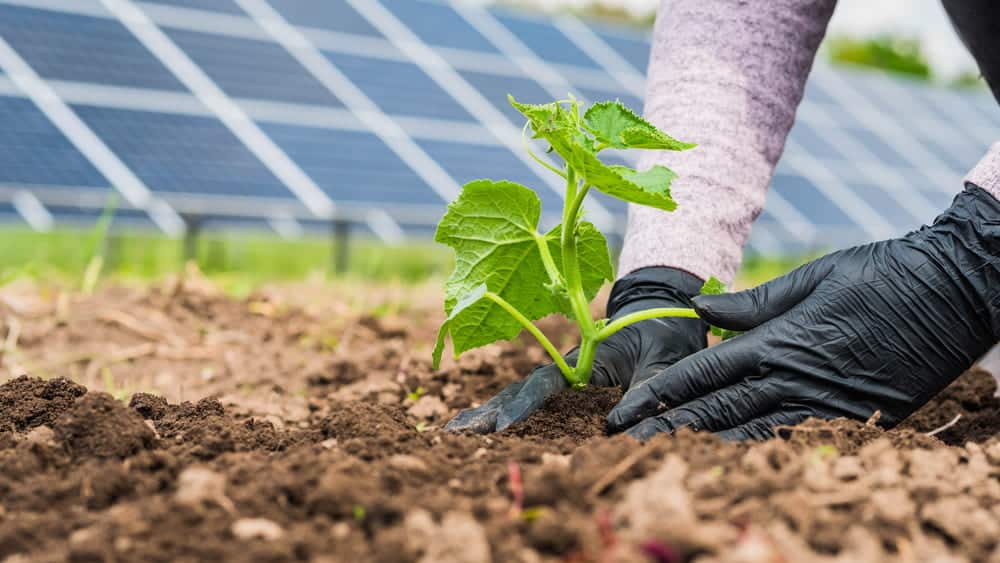
Solar farms are an essential component in the fight against climate change. They capture sunlight, convert it into electricity, and create clean, renewable energy that benefits residences, businesses, and entire communities. Typically, community solar farms take up a minimum of ten acres of land to support the energy demands of local communities—and sometimes much, much more. While there are several incredible benefits to embracing solar farms, some landowners have concerns that implementing solar arrays could harm the soil. In this article, we’ll debunk common misconceptions about how solar farms interact with soil and explore the benefits of developing community solar in Pennsylvania.
Why Are Farmers Against Solar Farms?
While many farmers are shifting their focus from farming crops to farming sunlight, some are reluctant to embrace solar development. Here are four common misconceptions about implementing solar farms:
Misconception #1: Solar Farms Lead to Soil Degradation
Unlike fossil fuel-driven power plants, solar farms produce zero pollution. No dangerous chemicals leak into the soil, rendering it useless. Instead, the shade solar panels provide can reduce moisture loss, helping preserve soil structure and health. Land leases for solar farms can last from between twenty to forty years. That means the land gets a good long rest, allowing overused soil to regenerate and improve fertility over time.
Misconception #2: Solar Farms Reduce Available Agricultural Land
Solar farms frequently utilize marginal lands that are less suitable for intensive farming due to poor soil quality, steep slopes, or other limiting factors. This strategy of dual land use ensures that prime agricultural lands remain dedicated to food production while less productive areas contribute to energy generation.
Misconception #3: Solar Farms are Harmful to Local Ecosystems
The development of community solar can greatly enhance biodiversity. Solar farms can be designed to include native plant species under and around the panels, creating habitats for pollinators and other wildlife. Local regulations may stipulate the preservation of certain habitats during the development of solar farms as well. This biodiversity-friendly approach can lead to healthier ecosystems and beneficial relationships between solar farms and the surrounding environment.
Misconception #4: Solar Farms Take Jobs Away From Farmers
While the transition to solar farming might seem to threaten traditional farming jobs, it actually introduces new employment opportunities. Solar farms require skilled workers for installation, maintenance, and monitoring, creating jobs in the renewable energy sector. Also, farmers who lease land for solar projects can benefit from a steady, passive income stream, providing financial stability and supporting the growth of farms for years to come.
Why Consider Solar Farms in Pennsylvania?
Pennsylvania is vigorously pursuing the development of solar farms state-wide. The state will need an estimated 124 square miles of land to achieve its ambitious sustainable energy goals. Here are five advantages to participating in solar farm development:
Economic Benefits
For Pennsylvania, the adoption of solar farms represents a promising economic opportunity. According to a 2018 plan released by the Pennsylvania Department of Environmental Protection (DEP), Pennsylvania seeks to drive solar power generation up from less than 1% to 10% by 2030. These projects offer landowners a stable and lucrative income source through lease agreements. Also, the solar industry’s growth stimulates job creation, providing employment in installation, maintenance, and administration. The influx of investment in renewable energy can have a revitalizing effect on rural communities, supporting local businesses and infrastructure development.
Agricultural Synergy
The concept of agrivoltaics, where solar panels and agriculture coexist, presents an innovative solution for Pennsylvania’s farmers. This approach allows for the cultivation of shade-tolerant crops or the grazing of livestock under solar arrays, optimizing land use and enhancing farm productivity. Agrivoltaics can lead to more efficient water use, improved crop yields, and increased biodiversity, offering a sustainable model for future agricultural practices.
Environmental Advantages
Solar farms contribute significantly to reducing carbon emissions, aligning with Pennsylvania’s environmental goals. The transition to clean energy sources like solar power helps combat climate change and reduces reliance on fossil fuels. Solar farms support sustainable land management practices by preserving soil quality and promoting biodiversity, contributing to the environment’s overall health.
Energy Security
Investing in solar farms enhances Pennsylvania’s energy security. Solar energy provides a reliable and predictable power source, reducing dependence on imported fuels and contributing to a more resilient energy grid. This independence not only safeguards against fluctuations in energy prices but also ensures a steady supply of electricity to meet the state’s needs.
Community Support
Community solar projects enable individuals and businesses who cannot install solar panels on their properties to still participate in and benefit from clean energy. With US Light Energy, anyone with a utility account can become a subscriber to a solar farm in their area. Subscribing to solar energy can yield a guaranteed 10% in savings on utility bills!
US Light Energy is a New York-based distributed generation energy development company specializing in community solar facilities and renewable energy solutions. If you’re interested in leasing your land in Pennsylvania, we’d be happy to talk with you! Contact us today to find out if your land qualifies for solar farm development. U.S. Light Energy is leading the charge for a new generation.
